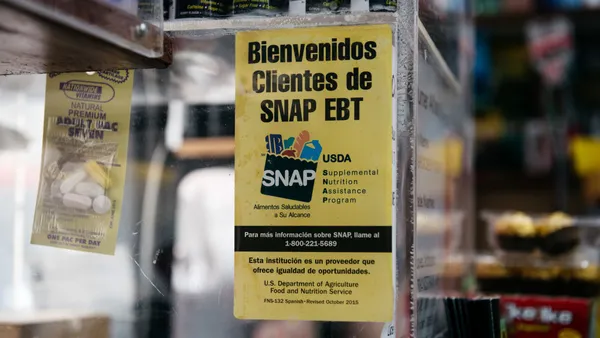Dive Brief:
- Albertsons will roll out at-home COVID-19 test kits across its pharmacies this fall, the company announced in a press release on Wednesday.
- The testing program is in partnership with genomics firm Phosphorus, which developed its at-home test that was granted emergency approval by the FDA in June.
- The tests, which are self-administered by taking a saliva sample, typically return results within 72 hours of customers sending the sample to a lab. They were piloted by Albertsons pharmacies in Houston, Austin, and Boise. Patients will be required pay out of pocket for a test, and can then later submit receipts to their insurance provider for reimbursement.
Dive Insight:
As grocery rival Kroger leads the field with an at-home COVID-19 test kit which it first rolled out in July, Albertsons is looking to make up lost ground with its new Phosphorus partnership. Its lab results window of 72 hours, however, promises less than Kroger Health, which says its test kits produce rests in between 24 and 48 hours.
In contrast with the Kroger Health at-home test, which involves self-administration using a nasal swab observed over video by a healthcare provider, the Albertsons test involves taking a saliva sample. Albertsons Companies Pharmacy GVP Dan Salemi argued the benefits of the saliva sample as being “easy to use and comfortable." The simplicity of the saliva test should also mean a lessened burden on healthcare providers having to ensure that patients are correctly administering the test.
The FDA has said that nasopharyngeal swabs, taken from the throat, are the most reliable means of testing. A saliva test developed by Yale researchers achieved a similar false-negative rate as a nasal swab test for hospital patients in a recent study.
As coronavirus cases failed to drop off across the U.S., many COVID-19 testing laboratories have been strained by the demand for tests, resulting in lengthy wait times in many regions. In mid-July, 42% of test results took four days or more to come back, according to a report by researchers at Northeastern, Rutgers, Harvard, and Northwestern. According to new data from major commercial laboratory Quest Diagnostics, however, wait times have dropped down to an average of two days this past month.
At-home testing kits provide several advantages over drive-through tests: greater access for people with disabilities, people with risk factors for COVID-19 and those without a means of transportation to a testing center. The at-home kits would also mean that fewer nurses would be required to conduct in-person coronavirus tests at the homes of high-risk and elderly people, saving resources and personal protective equipment. The Albertsons test kit will be available for collection via pickup or delivery after patients have completed an online questionnaire.
On Wednesday, Kroger Health also announced its flu shot program in advance of this year’s flu season, with touchless appointments and drive-thru vaccinations. Doug Cornelius, health and wellness director for Kroger Health, said that comprehensive flu shots were essential to minimize misidentification of the flu as COVID-19, which can display similar symptoms.












